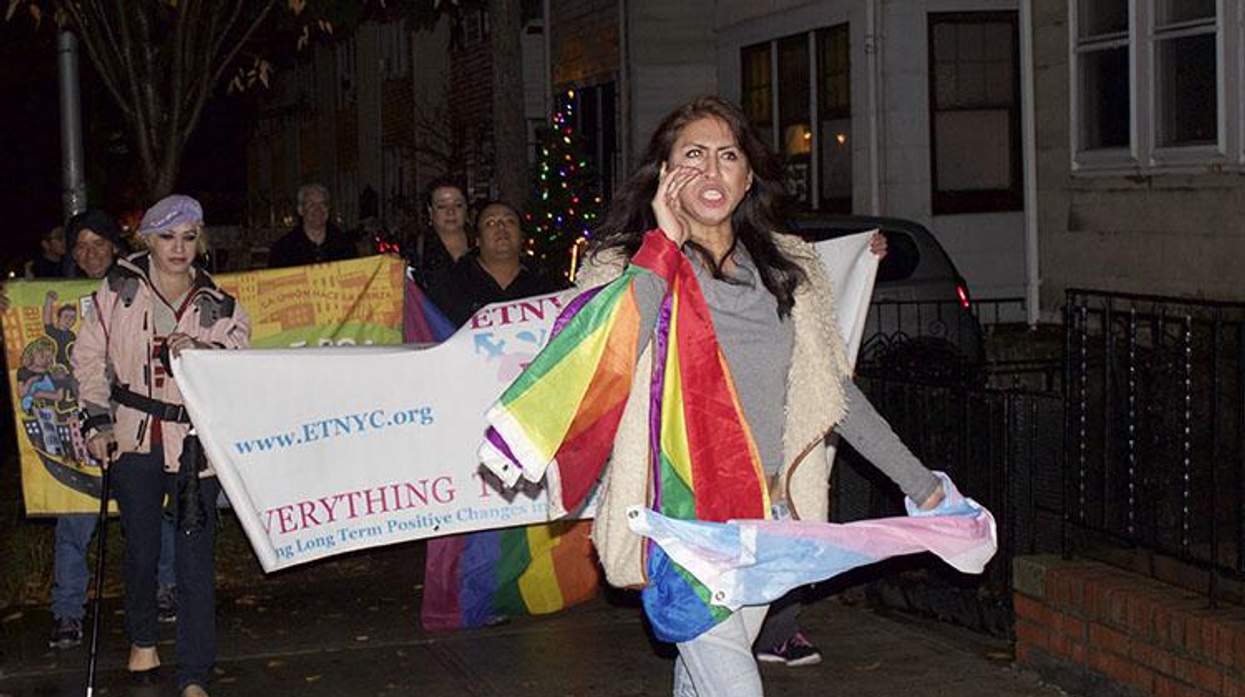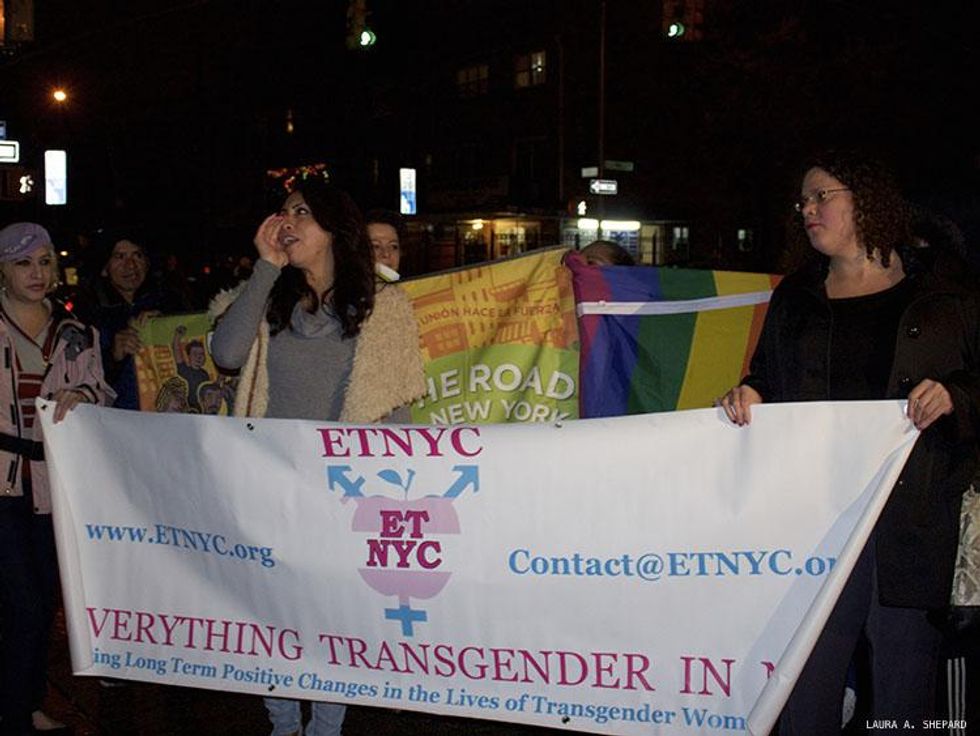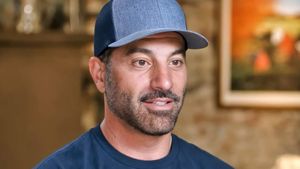A dozen or more transgender activists rallied in New York City Tuesday night demanding police take swift action in apprehending the man who brutally attacked a trans woman. A spokesman for the New York City Police Department tells The Advocate Kathy Sal. 35, was savagely beaten early Sunday morning in front of her home in the Jackson Heights neighborhood of Queens.
Although in their report police identified Sal as a man, the spokesman says they are aware she was known to friends as Kathy. The spokesman says Sal was rushed to Elmhurst Hospital in critical condition with injuries to her head and face. Sources tell The Advocate doctors are treating her for facial and cranial fractures as well as bleeding in her brain.
Friends of Sal's tell The Advocate she is now conscious and talking, but having some difficulty with her memory. Still, given the severity of her injuries, doctors at Elmhurst Hospital told Sal's friends they were impressed at the progress she's already made in her recovery. Joining them at her bedside Tuesday was transgender activist Jennifer Louise Lopez.
"Oh God. Not again," was Lopez's initial reaction to the news of Sal's assault, she tells The Advocate. Lopez says that Sal's case does not have to end like the fatal beating two years ago of another New York City trans woman, 21-year-old Islan Nettles.
Lopez says the 2013 murder of Nettles had a profound effect on her and other advocates in New York City's trans community, and beyond.
It took detectives and the Manhattan District Attorney 18 months to arrest and finally indict 24-year-old James Dixon of Brooklyn, even though he admitted beating Nettles within days of the attack, and the fact that the crime occurred right on the police's doorstep. In March, Dixon was charged with delivering the devastating blow to Nettles's face that caused her to fall and hit her head on the pavement outside the Housing Police Department's PSA 6 stationhouse, leading to a brain injury. The indictment against Dixon also accuses him of striking Nettles several more times while she lay on the ground, compounding her injuries to the point that she was later declared brain-dead at Harlem Hospital and taken off life support a few days later.
Just as Nettles's attack consisted of a severe beating after being knocked to the pavement, Sal's assault was similarly heinous. New York City TV station WCBS reported the crime as a so-called "curb stomp"--urban slang for a type of maiming comprised of prolonged strikes while a victim already lies on the street. Like other assaults of LGBT people typified by escalated, prolonged savagery, Sal's assailant allegedly argued with her and, after striking her, banged her head again and again into the pavement, reported DNAinfo.
WCBS also reported that the assailant rifled through Sal's pockets before running away. Police say they have no leads and no suspects at this time.
With Nettles's case still on her mind, Lopez sprang into action despite her initial misery upon hearing of Sal's assault. "After my first reaction, I thought, 'What can we do?" Lopez says, "and I thought that we must mobilize our transgender community here in New York City to get the message out that things must be done differently this time around in investigating the assault."
She is energized. In less than a day, Lopez put together Tuesday night's anti-violence rally in Queens. Another, larger demonstration is being orgaanized by other groups for Thursday.

Lopez (above, right) is the Executive Director of Everything Transgender in New York City, a direct services networking organization that helps trans New Yorkers combat homelessness, suicide, lack of access to affordable education, family rejection, and unemployment.
She tells The Advocate she believes fervently that the trans community must work with law enforcement, merging both respect for their expertise with critique of the frequent dismissal of trans experiences as less than a priority among other crimes. With that respect in mind, she identifies three actions that police and the local news media can immediately take:
First, if they have not done so already, Lopez urges law enforcement to quickly interview witnesses, both those who have already been identified in media reports and those who have yet to come forward publicly. As with other trans-related crimes, many individuals witnessed facets of the assault. DNAinfo spoke with a 29-year-old neighbor of Sal named Eliana Abili, who said that the Jackson Heights neighborhood becomes "crazy" after dark.
Sal's landlord described the altercation to DNAinfo, emphasizing key details like the assailant repeatedly banging her head onto the pavement. DNAinfo also mentioned another witness, Jimmy Flores, the owner of a bike shop who characterized the neighborhood as "terrible, people fighting, people robbing," with "drunk people" who "flood out of the bars on Roosevelt Avenue and also harass the transgender people who tend to congregate on the corner." And of the trans people in the neighborhood, Flores notes that, "There's so many [...] they don't do anything" but "there's a lot of drunk people in the street and they bother those people."
Second, Lopez suggests that witness accounts about the severity of the crime and the character of the neighborhood may help law enforcement bolster expanded hate crimes charges. She believes swift assignments of hate crimes charges would help the public understand the biased nature of these kinds of attacks, and she points out that the original charges in Nettles's case were only misdemeanors, prior to her death.
Third, Lopez asks the local news media to stop its transphobic reporting of incidents of violence against trans people, and she singles out some of the reporting on Sal's assault as particularly egregious. Among those are WCBS which deadnamed Sal in reporting that her "given name was Ricardo Sal but goes by the name Kathy" ("Deadnaming" is a term used in the trans community to describe when someone identifies a trans person by their former name instead of respecting their choice of preferred name; whether it has or hasn't been legally changed should not overrule a trans person's preference). Other examples include the New York Daily News and Newsday, whose pejorative misgendering of Sal and erroneous identification of her as a "crossdresser" in headlines that blared "Crossdressing Queens man attacked." Lopez emphasizes that this transphobic reporting is its own kind of violence that, while not physical, maligns trans individuals in the eyes of the public by devaluing their identity.
Police tell The Advocate the NYPD's Hate Crime Task Force was notified of the attack, but that this case has not yet been classified as a hate crime. Detectives from the 115th precinct are investigating, and should they determine the assault was motivated by Sal's gender expression or identity, then, the NYPD spokesman says, the task force will take over the investigation.





































































Charlie Kirk DID say stoning gay people was the 'perfect law' — and these other heinous quotes